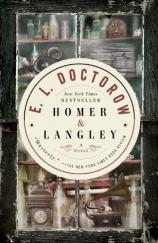Homer & Langley
Review
Homer & Langley
We Americans are inveterate collectors of stuff. In fact, as a
recent article in the New York Times Magazine reported, we
are so skilled at accumulating possessions and need so much
additional space to stash them that there are 2.3 billion square
feet of self-storage space in this country. In his latest novel,
E.L. Doctorow, the brilliant fictional chronicler of American
history in novels like RAGTIME, THE BOOK OF DANIEL and THE MARCH,
eloquently reinvents the story of the real-life Collyer brothers,
exemplars of that trait of acquisitiveness and the way it can drift
into pathology.
In March 1947, New York City police removed from a four-story
brownstone on Fifth Avenue the bodies of two brothers, Homer and
Langley Collyer, the reclusive, sixtyish sons of a prominent
gynecologist. As a crowd of gawkers numbering in the hundreds
looked on, the authorities eventually disposed of more than 100
tons of rubbish accumulated in years of obsessive hoarding.
That’s the spare framework on which this skillfully imagined
novel is erected.
Deftly liberating the Collyers’ story from the historical
record, Doctorow moves their home to a different location on Fifth
Avenue, reverses the brothers’ birth order and toys with
other biographical details. Most dramatically, he has Homer and
Langley surviving deep into the 20th century, long enough to
experience the invention of television, the moon landing and the
Vietnam War, as they open their home to a group of hippies who take
up residence after an antiwar protest in Central Park. The panorama
of that century unfolds, paradoxically, through the lives of these
recluses. Time passes, and like the massive collection of objects
growing inside, its detritus washes up against the shore of the
Collyer home.
Homer and Langley are both damaged men --- Homer, who gradually
lost his eyesight as a teenager, and Langley in a mustard gas
attack in World War I. It would have been easy for Doctorow to
portray them as a pair of cranks, as the real Collyers appeared
when they first attracted the notice of their contemporaries.
Instead he has given both, especially Homer, the narrator of the
novel, rich and complex interior lives.
Langley, cynical and calculating, purchases every edition of
each day’s New York newspaper, clipping and filing stories in
an effort to create some Platonic ideal of the ultimate newspaper.
“He wanted to fix American life finally in one
edition,” Homer writes of his brother, “what he called
Collyer’s eternally current dateless newspaper, the only
newspaper anyone would ever need.” Of course, he observes
drily, “It was a big organizational problem for him to cull
from years of daily newspapers the signal episodes and kinds of
activities that are timeless.”
Homer’s sightless existence is not without its
compensations. There’s the music he plays on his beloved
Aeolian piano and the women who drift in and out of his life; he
beds several of them, but one, a young woman he came to know while
playing piano in a movie theater, remains elusively out of reach
and haunts his dreams for years.
With seeming inevitability the trash piles higher, portrayed in
this partial description of the contents of the backyard: “an
old refrigerator, boxes of plumbing joints and pipes, mill-bottle
crates, bedsprings, headboards, a baby carriage with missing
wheels…a real fire hydrant, automobile tires, stacks of roof
shingles, odd pieces of lumber, and so on.” Over time, Homer
notes, “every room was becoming an obstacle course for
me.” Describing Langley’s vast collection of Army
surplus, Homer comments, “It was as if the times blew through
our house like a wind, and these were the things deposited here by
the winds of war.” But all of that pales alongside
Langley’s decision to replace the dining room table with a
Model T, whose engine he attempts to use as a generator to save on
electric bills. Doctorow’s measured, almost offhanded,
account of the claustrophobic environment into which Langley
transforms their dwelling gradually takes on an hypnotic
quality.
It’s tempting to question why Homer never objects to his
brother’s self-destructive hoarding that in the end will doom
both of them. Here, Doctorow’s novel shines in its depiction
of the solicitude of one brother for the other. Langley resorts to
home remedies in a vain attempt to cure Homer’s blindness.
And when the pair are nearly entombed in their garbage-filled
surroundings, Langley attempts to guide Homer through the maze of
booby traps he has set and makes sure his ailing brother is fed. In
the end, Homer poignantly observes, “We were the ghosts who
haunted the house we had once lived in.”
E.L. Doctorow has moved Homer and Langley Collyer from the
sideshow of American history to center stage. Strange as their
story may be, he makes us feel privileged, if in an odd way
perhaps, to share it.
Reviewed by Harvey Freedenberg (mwn52@aol.com) on January 22, 2011
Homer & Langley
- Publication Date: September 7, 2010
- Genres: Fiction
- Paperback: 224 pages
- Publisher: Random House Trade Paperbacks
- ISBN-10: 0812975634
- ISBN-13: 9780812975635





